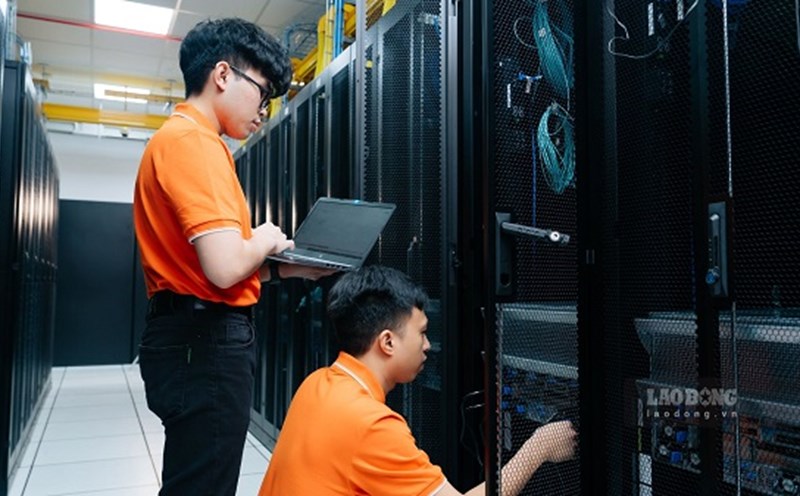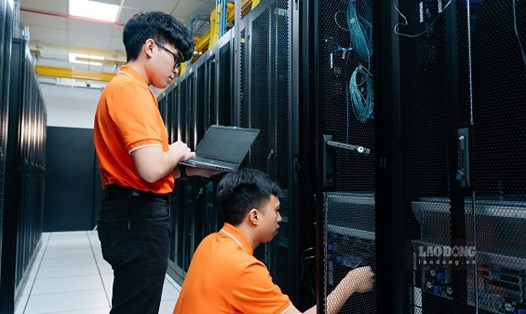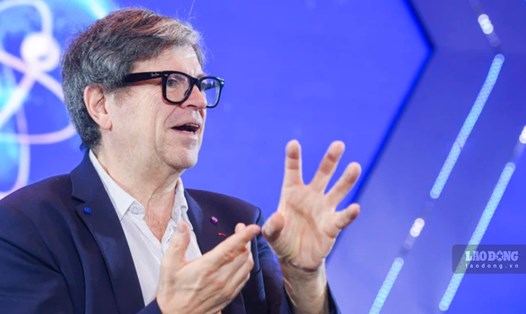* I'm...
This is a “classic” statement of leading experts when faced with the question: “Who will AI replace?”. Not only that, the above statement also sets out the mandatory requirement for using AI and technology to survive and develop.
In the article, “Digital transformation - An important driving force for developing productive forces, perfecting production relations, bringing the country into a new era” - General Secretary To Lam mentioned AI many times and placed AI in a very important position.
The General Secretary wrote: “Artificial intelligence (AI), Internet of Things (IoT), big data and cloud computing are gradually becoming important production tools in many industries and fields” and “Digital transformation is not simply the application of digital technology to socio-economic activities, but also the process of establishing a new, advanced and modern production method - “digital production method”, in which the characteristic of the productive forces is the harmonious combination of humans and artificial intelligence; data becomes a resource, an important means of production; at the same time, production relations also have profound changes, especially in the form of ownership and distribution of digital means of production”.
Two propositions stand out. First, it must be recognized that AI is gradually becoming an important “tool of production”. Second, the harmonious combination of humans and artificial intelligence will have to become a characteristic of the productive forces in the process of building a new mode of production – the digital mode of production.
In Marxist philosophy, the means of production are an important part of the means of production, including the material means that people use to act on the objects of labor to transform them into products to serve the needs of people and society. The means of production can include machines, equipment, hand tools, and other means to support the production process.
In today's era, it is undeniable that AI is a revolutionary production tool to increase labor productivity.
A report by Microsoft Vietnam released last year showed that 2024 is considered the year of AI, with the use of Generative AI technology in the workplace nearly doubling in the past 6 months. The recently released 2024 Job Trends Index report also shows that 88% of Vietnamese knowledge workers are applying AI in their work and 93% of AI-savvy people in Vietnam often start their workday with AI.
These telling numbers show that AI is permeating every industry and organization, having a strong impact on awareness, thinking and changing the way people work. “AI is a technological product, a tool with outstanding features that supports people in their daily work. Instead of worrying about AI replacing humans and taking away jobs, we need to change the way we think and act by using AI responsibly, leveraging the power of AI to achieve higher productivity, greater growth, thereby increasing the satisfaction of employees and leaders. When people are freed from repetitive tasks, they can exploit their intelligence in more creative and strategic tasks” - General Director of Microsoft Vietnam - Nguyen Quynh Tram shared.
In fact, the application of AI in Vietnamese units and enterprises is only in the exploration phase and participating in some specific tasks, playing a supporting role, but the results are considered obvious.
At Maple Company Limited (part of Ramatex Group) in Hai Phong, AI has been applied in recruitment, labor training and professional activities. Chairman of Maple Company Limited's Trade Union - Bui Hong Lien said that in 2 years, the company has applied AI in building professional and skills training programs for workers, as well as in policy and law propaganda activities for union members. Applying AI helps make video clips and lecture explanations in training and recruitment become faster and easier.
Or in the medical field, AI is playing an important role in cancer treatment, especially colorectal cancer. At Bach Mai Hospital, AI supports doctors in diagnosing images, pathology and analyzing genetic data, thereby helping to choose optimal targeted and immunotherapy methods. This not only improves treatment effectiveness but also minimizes side effects and improves the patient's quality of life.
AI is widely applied in many medical fields in Vietnam. At the Stroke Center, Bach Mai Hospital, AI helps update advanced treatment methods, significantly improving the quality of care for stroke patients.
According to Associate Professor, Dr. Mai Duy Ton, AI provides accurate and timely information, supporting doctors in making clinical decisions. Or at Hanoi Medical University Hospital, AI is changing the approach to diagnosing and treating many diseases. This technology helps detect liver cancer early through CT-scan or MRI, diagnose endoscopic lesions more accurately, and reduce errors in pathological analysis. AI is also applied in smartphone applications to support patients in managing chronic diseases such as diabetes, hypertension, and hepatitis B...
**
AI is not simply a story of application, but also a factor that promotes individual capacity, increases labor productivity, and contributes to the breakthrough growth of the entire economy.
Experts predict that in the next 10-15 years, many current jobs and occupations will decrease or disappear completely, while new jobs will also appear. The shift in human resource structure is inevitable and technology plays an important role in determining this trend of career and personnel shifts.
It is predicted that some occupations will gradually decrease and disappear in the future, including: Accountant; Bank teller; Data entry clerk; Secretary... At the same time, the list of occupations that will appear and attract a large human resource in the future are mostly related to technology such as: AI and machine learning (ML) expert; Data analyst; Information security expert; Digital finance engineer (FinTech); Robot engineer; Digital transformation expert; Smart agricultural equipment operator/specialist...
In a workshop on the role of the working class in the Technological Revolution, Dr. Le Xuan Dinh raised the question: “The development of technology can affect the spirit and change the lifestyle of workers. The problem is how to provide young workers with knowledge, access, use and master new technologies to improve living standards and income.”
In order for no one to be left behind in the story of AI application, timely solutions are needed, because the rapid development of technology is creating great challenges. Turning AI into a source of power and energy in the process of entering the new era requires the learning and self-learning process of each person in the change of technology.
For businesses, it is necessary to have a plan to not miss the benefits of applying AI on a large scale and have a specific strategy. Accordingly, leaders need to proactively seize the opportunity to turn this momentum into investment benefits. Because AI is no longer the future, but the present. Leaders should start now, perhaps with small projects, to understand how AI can help them, not only in ensuring the safety of the organization's data but also in the long-term investment and development plan of the company, business.
Mastering AI and turning the power of AI into the power of the new era is the responsibility of every individual, every unit, and every enterprise. With determination, it can be done, as General Secretary To Lam said: "We will definitely successfully carry out the Digital Transformation Revolution, create a breakthrough in developing productive forces and perfecting production relations, bringing our country and our people to a new era, an era of progress, civilization, and modernity."











